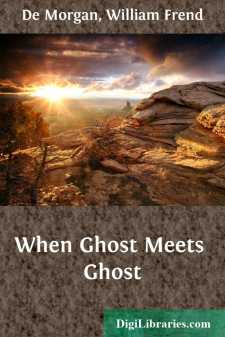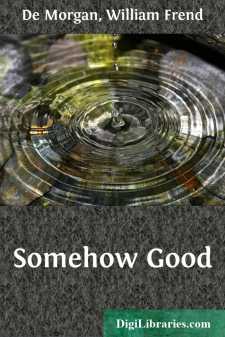Categories
- Antiques & Collectibles 13
- Architecture 36
- Art 48
- Bibles 22
- Biography & Autobiography 813
- Body, Mind & Spirit 142
- Business & Economics 28
- Children's Books 17
- Children's Fiction 14
- Computers 4
- Cooking 94
- Crafts & Hobbies 4
- Drama 346
- Education 46
- Family & Relationships 57
- Fiction 11829
- Games 19
- Gardening 17
- Health & Fitness 34
- History 1377
- House & Home 1
- Humor 147
- Juvenile Fiction 1873
- Juvenile Nonfiction 202
- Language Arts & Disciplines 88
- Law 16
- Literary Collections 686
- Literary Criticism 179
- Mathematics 13
- Medical 41
- Music 40
- Nature 179
- Non-Classifiable 1768
- Performing Arts 7
- Periodicals 1453
- Philosophy 64
- Photography 2
- Poetry 896
- Political Science 203
- Psychology 42
- Reference 154
- Religion 513
- Science 126
- Self-Help 84
- Social Science 81
- Sports & Recreation 34
- Study Aids 3
- Technology & Engineering 59
- Transportation 23
- Travel 463
- True Crime 29
When Ghost Meets Ghost
Description:
Excerpt
CHAPTER 0
A CONNECTING-LINK BETWEEN THE WRITER AND THE STORY, AMOUNTING TO VERY LITTLE. THERE WAS A COURT SOME FIFTY YEARS SINCE IN LONDON, SOMEWHERE, THAT IS NOW NOWHERE. THAT'S ALL!
Some fifty years ago there still remained, in a street reachable after inquiry by turning to the left out of Tottenham Court Road, a rather picturesque Court with an archway; which I, the writer of this story, could not find when I tried to locate it the other day. I hunted for it a good deal, and ended by coming away in despair and going for rest and refreshment to a new-born teashop, where a number of young ladies had lost their individuality, and the one who brought my tea was callous to me and mine because you pay at the desk. But she had an orderly soul, for she turned over the lump of sugar that had a little butter on it, so as to lie on the buttery side and look more tidy-like.
If the tea had been China tea, fresh-made, it might have helped me to recollecting the name of that Court, which I am sorry to say I have forgotten. But it was Ceylon and had stood. However, it was hot. Only you will never convince me that it was fresh-made, not even if you have me dragged asunder by wild horses. Its upshot was, for the purpose of this story, that it did not help me to recollect the name of that Court.
I have to confess with shame that I have written the whole of what follows under a false pretence; having called it out of its name, to the best of my belief, throughout. I know it had a name. It does not matter; the story can do without accuracy—commonplace matter of fact!
But do what I will, I keep on recollecting new names for it, and each seems more plausible than the other. Coltsfoot Court, Barretts Court, Chesterfield Court, Sapps Court! Any one of these, if I add seventeen-hundred-and-much, or eighteen-hundred-and-nothing-to-speak-of, seems to fit this Court to a nicety. Suppose we make it Sapps Court, and let it go at that!
Oh, the little old corners of the world that were homes and are gone! Years hence the Court we will call Sapps will still dwell in some old mind that knew its every brick, and be portrayed to credulous hearers yet unborn as an unpretentious Eden, by some laudator of its tempus actum—some forgotten soul waiting for emancipation in an infirmary or almshouse.
Anyhow, I can remember this Court, and can tell a tale it plays a part in, only not very quick.
Anybody might have passed down the main street and never noticed it, because its arched entry didn't give on the street, but on a bay or cul-de-sac just long enough for a hansom to drive into but not to turn round in. There was nothing to arrest the attention of the passer-by, self-absorbed or professionally engaged; simultaneous possibilities, in his case.
But if the passer-by forgot himself and neglected his proper function in life at the moment that he came abreast of this cul-de-sac, he may have thereby come to the knowledge of Sapps Court; and, if a Londoner, may have wondered why he never knew of it before. For there was nothing in the external appearance of its arched entry to induce him to face the difficulties incidental to entering it. He may even have nursed intentions of saying to a friend who prided himself on his knowledge of town:—"I say, Old Cock, you think yourself mighty clever and all that, but I bet you can't tell me where Sapps Court is." If, however, he never went down Sapps Court at all—merely looked at his inscription and, recollecting his own place in nature, passed on—I shouldn't be surprised.
It went downhill under the archway when you did go in, and you came to a step. If you did not tumble owing to the suddenness and depth of this step, you came to another; and were stupefied by reaching the ground four inches sooner than you expected, and made conscious that your skeleton had been driven an equal distance upwards through your system. Then you could see Sapps Court, but under provocation, from its entry. When you recovered your temper you admitted that it was a better Court than you had anticipated.
All the residences were in a row on the left, and there was a dead wall on the right with an inscription on a stone in it that said the ground twelve inches beyond belonged to somebody else. This wall was in the confidence of the main street, lending itself to a fiction that the houses therein had gardens or yards behind them. They hadn't; but the tenants believed they had, and hung out chemises and nightgowns and shirts to dry in the areas they built up their faith on; and really, if they were properly wrung out afore hung up there was nothing to complain of, because the blacks didn't hold on, not to crock, but got shook off or blew away of theirselves. We put this in the language of our informant.
However, the story has no business on the other side of this wall. What concerns it is the row of houses on the left.
If ever a row of houses bore upon them the stamp of having been overtaken and surrounded by an unexpected city, these did....



